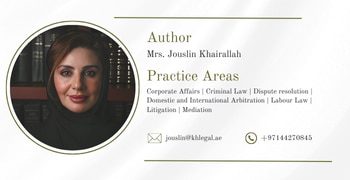Analysis of Commercial Case No. 514/2025 – May 26, 2025
The Abu Dhabi Court of Cassation recently issued an important ruling that reinforces several fundamental principles of UAE commercial law, particularly regarding limited liability companies, management disputes, and claims of contract simulation. This judgment provides valuable insights into how UAE courts interpret partner relationships and contractual obligations in commercial disputes.
Case Background
The case involved a dispute between partners in a limited liability company. The respondent filed a lawsuit (No. 881/2024) seeking the appointment of an accounting expert, dissolution and liquidation of the company, and a payment of AED 5,000,000 representing his share of the company’s capital, assets, and profits.
According to court records, the company was initially established on July 12, 2018, as a Single Person LLC, but was later converted to a Limited Liability Company on July 30, 2019, through a conversion contract authenticated by the competent authorities. The fifth clause of this contract stipulated that the respondent’s share was 50% of the company.
The respondent claimed that despite being appointed as an administrative manager in the company’s articles of association, the appellant manager had:
- Failed to hold general assembly meetings
- Failed to open a bank account for the company
- Withheld financial statements and balance sheets
- Seized all profits without distribution
After the court-appointed expert submitted their report, the respondent amended his requests to include removal of the appellant from company management and his own appointment as manager, or alternatively, the appointment of another manager agreed upon by both partners.
Key Legal Principles Established
1- Scope of Court Authority Based on Final Requests
The Court of Cassation reaffirmed the principle that the scope of a case is determined by the final requests submitted by the parties. The Court emphasized that:
“The court must limit its consideration to what is presented before it in terms of requests, whether regarding the subject matter or the parties to the case, and must be bound in its judgment by the limits of what is submitted to it.”
The Court further clarified that what binds the court and requires its consideration is “the definitive, explicit request that reaches its hearing in a manner indicating the petitioner’s insistence upon it.” This underscores the importance of formal final submissions in UAE commercial litigation.
2- Principles Regarding Contract Simulation Claims
One of the most significant aspects of this judgment is its thorough examination of the legal standards for proving contract simulation under UAE law. The Court established that:
“Simulation is established by the existence of a willful legal appearance contrary to reality, intended to create an illusion of validity and conceal what the parties actually intended, whether it is absolute simulation denying the existence of the transaction or relative simulation aimed at
concealing another transaction or condition or provision in the contract.”
The Court emphasized that parties to a written contract cannot prove its simulation except through written evidence that contradicts what is established in writing, in accordance with the general rules of evidence that principally require written proof when contesting written evidence. However, an exception exists when there is fraud or circumvention of the law, in which case simulation may be proven by all methods of evidence.
3- Judicial Discretion in Evaluating Simulation Evidence
The judgment reinforces the trial court’s discretionary authority to evaluate evidence of simulation, either affirming or denying it, provided that its ruling is based on sound reasoning supported by the evidence in the case file.
The Court noted that the conversion contract explicitly stated in clause 5/2 that both partners acknowledged that the value of the shares had been paid in full. Additionally, the expert report confirmed that the respondent had made several financial transfers from his account to the company’s account as part of his capital contribution, which further supported his status as a legitimate partner.
4- Effect of Subsequent Agreements on Prior Contracts
The Court addressed the appellants’ claim regarding a share waiver agreement dated August 1, 2019, which allegedly showed that the respondent’s partnership was simulated. The Court determined that the conversion contract was executed later than this agreement, making it the governing document for the parties’ rights.
This establishes an important principle: when evaluating contradictory contractual documents, courts will generally give greater weight to more recent agreements that regulate the same subject matter.
Legal Implications
This judgment has significant implications for business partners and commercial lawyers in the UAE:
- Documentation of Partnership Arrangements: The case underscores the importance of properly documenting partnership arrangements and capital contributions, as these will be given significant weight by courts in partnership disputes.
- Burden of Proof in Simulation Claims: Parties alleging contract simulation face a high evidentiary burden, particularly when challenging formally authenticated documents. Such claims generally require written evidence unless fraud or circumvention of the law can be established.
- Corporate Governance: The case highlights the serious consequences for managers who fail to fulfill their statutory and contractual obligations regarding corporate governance, financial transparency, and profit distribution.
- Finality of Court Submissions: Litigants must carefully craft their final written submissions, as courts will strictly adhere to the requests formally presented in these documents.
Conclusion
This Court of Cassation judgment provides valuable guidance on several important aspects of UAE commercial law, particularly regarding the standards for proving contract simulation and the rights of partners in limited liability companies.
It reinforces the UAE judiciary’s commitment to upholding properly documented contractual relationships while providing remedies for partners who have been denied their management rights or profit entitlements.
Having said that, contact Khairallah Advocates & Legal Consultants and benefit from our free 30-min legal consultation.
*Disclaimer: our blogs, law updates, and FAQ’s are freely distributed for educational purposes and to showcase recent updates and regulations in the UAE’s framework.
If you have any questions and need assistance, contact us at our number or book an appointment online.
Authors:






